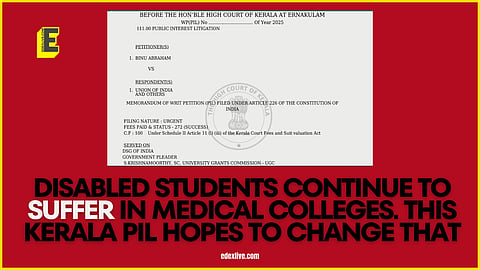

In a significant development in the case for disabled rights in India, a Public Interest Litigation (PIL), represented by Advocate S Gopakumar, was filed on Friday, March 21, 2025, before the Kerala High Court, which highlighted the "pathetic and inhuman treatment" faced by disabled students in medical colleges across Kerala, as well as in the country.
The petition accused authorities of failing to implement accessibility guidelines as per the 2017 case of Disabled Rights Group & Anr V Union of India & Ors, thereby violating the Constitutional and legal rights of students with disabilities.
The Accessibility Guidelines are of importance, as they vouch for accessible environments for students with disabilities, ensuring their equal participation and access to higher education.
Why was the PIL filed?
The petitioner, Binu Abraham, told EdexLive that it was a need of the time and an issue that certainly lacked enough exposure.
"The cases left me distraught...I was surprised to know that these students, who may not be equal to others physically yet are full of talent, are subjected to inhumane treatment, that too at medical institutions!" he expressed.
The PIL filed by him draws attention to the systemic discrimination and lack of accessible facilities faced by students with benchmark disabilities (PwBD) under the Rights of Persons with Disabilities Act, 2016 (RPwD Act).
The petition also alleges that medical colleges in Kerala, governed by the Kerala University of Health Sciences (KUHS) and the National Medical Commission (NMC), have neglected to provide an inclusive environment as mandated by law.
The petition cites rampant issues, such as:
- Inaccessible infrastructure
- Lack of reasonable accommodations in examinations
- A non-inclusive curriculum, particularly under the new Competency Based Medical Education (CBME) 2024 framework.
The petition argued that despite the University Grants Commission’s (UGC) "Accessibility Guidelines and Standards for Higher Education Institutions and Universities" issued in June 2022, no meaningful action has been taken to ensure their enforcement in medical education.
This failure forces many PwBD students to drop out, undermining their fundamental rights to equality, dignity, and education under Articles 14, 15, and 21 of the Constitution.
Demands of the PIL
The petition seeks:
1) Implementation of Accessibility Guidelines: The NMC and KUHS should strictly enforce the UGC’s Accessibility Guidelines in medical colleges, ensuring an inclusive educational environment for PwBD students.
2) Cancelling CBME 2024: A directive introduced by the NMC that failed to incorporate inclusivity measures and the Rights of Persons with Disabilities (RPwD) Act of 2016.
3) Annual compliance checks: An order directing the Union of India, UGC, Chief Commissioner for Persons with Disabilities, State of Kerala, and the State Commissioner to conduct yearly inspections of medical colleges to ensure adherence to accessibility standards and punitive actions for non-adherence.
4) Sensitisation programmes: A plea to implement ongoing sensitisation initiatives for teaching and non-teaching staff to foster empathy and awareness regarding the needs of PwBD students.
5) Immediate action required: As an immediate measure, it urges the court to direct KUHS to collect and submit a compliance report from affiliated medical colleges regarding the implementation of the measures within a specific time period.
Ableism fuelling a silent torment: Testimonials
For students with physical disabilities pursuing MBBS in India, the dream of becoming a doctor is now being overshadowed by a system that seems to be against them.
A PwD medical student from Kerala (under the condition of anonymity) shared a heart-wrenching account of his struggles, revealing a stark lack of support, awareness, and empathy in medical colleges.
“I have locomotive disability,” the student said, describing how a spinal condition, kyphosis scoliosis, causes severe back pain after just an hour of sitting. “It gets difficult to write exams…the handwriting tends to get jumbled. The answer may be right, but the correction team will not be able to understand,” he says. Despite scoring high in theory this year, he failed to progress beyond his first year after exhausting all five attempts. “My fifth chance has been exhausted,” he said with a voice heavy with emotion.
The student was not offered any scribe, nor any assistance from his college.
While being admitted to the college in 2021, the student informed that he was not notified of any benefits that they are entitled to, such as fee compensation.
When a rule was mandated by the government to provide them with extra time for exams and practicals, he said, "My college didn’t tell me that I had this privilege. They treated us as regular students.” No extra time, no scribe, and no 25% compensation marks, as prescribed by UGC guidelines, were offered to him.
Narrating a painful incident, he said, “I know a lot about my subject, but because of the pain and struggle, sometimes the handwriting might get jumbled. That’s why I score less marks.”
Sharing more experiences of the same kind, he narrated to Edexlive the numerous times he felt powerless. “I pleaded with the invigilator for an extra five or ten minutes, but they were visibly irritated and refused to wait...They treat us poorly...," he trailed off.
This student’s experience is not an isolated one.
An advocate for disability rights and a teacher described that these educational spaces are increasingly becoming “hostile” driving many to drop out.
She further highlighted an instance where a faculty member reprimanded a disabled student, right in front of their parents, for sending a disabled child to study medicine.
She recounted that basic accommodations are absent, not even a disabled-friendly washroom.
On the mammoth failures of the system, she highlighted how these governing bodies, NMC and KUHS, have failed to implement these provisions and failed to add any value to the lives of these disabled kids.
“A moment of imbalance can end the growth of good talent," she added, directing her adage towards an inequitable system that seems indifferent to their pain, both physical and emotional.
How long will this change remain elusive? When will the government accept accountability? Will time tell?
